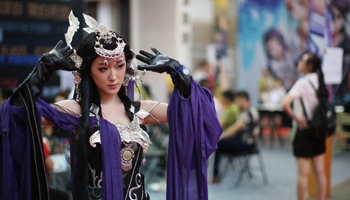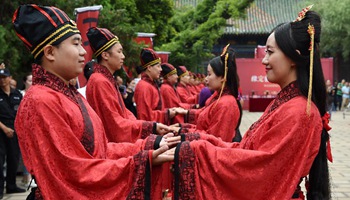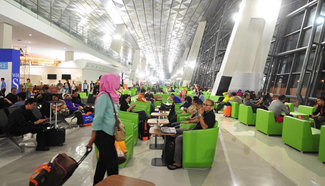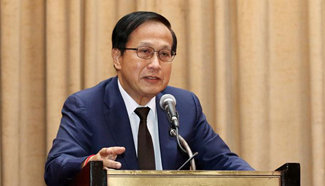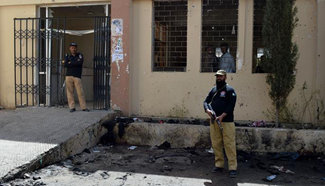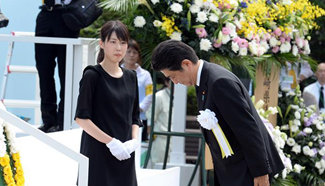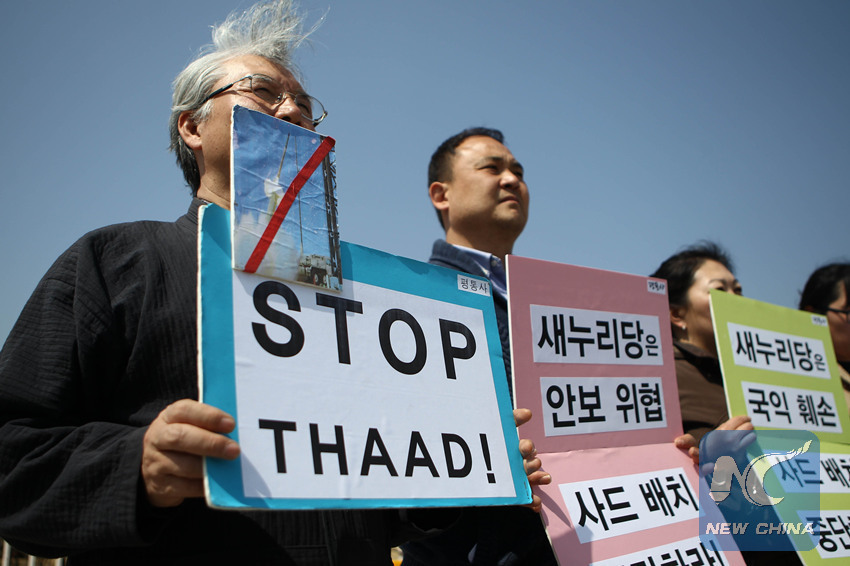
South Korean protesters hold placards in front of the National Assembly in Seoul, South Korea, April 1, 2015, during a rally against the deployment of the advanced U.S. missile defense system THAAD on the Korean Peninsula. (Xinhua/Seongbin Kang)
By Yoo Seungki
SEOUL, Aug. 9 (Xinhua) -- South Koreans opposing the deployment of Terminal High Altitude Area Defense (THAAD) in the country are being reviled as blind followers of the Democratic People's Republic of Korea (DPRK) or sycophant betrayers.
Such seditious moves are being driven by some of conservative local media outlets. South Korean President Park Geun-hye appeared to decide on Monday to join the move by criticizing opposition lawmakers visiting Beijing as sympathizers with China and describing other THAAD dissenters as pro-DPRK followers.
Branding those unfavorable to government policies as traitors or pro-DPRK followers, seen in a few cases under the past military dictatorships, seems not to be easy this time as the president is required to stigmatize about half of the South Koreans as turncoats.
Public opinion has run neck-and-neck over whether the THAAD deployment is in South Korea's national interests. Recently, more South Koreans, especially those in their 20s to 40s, are changing their minds to disagree with the THAAD deployment decision.
THAAD dissenters here do not brand those in favor of the U.S. missile defense system as blind pro-American followers though Seoul was pressured by Washington into making the hasty decision as part of the U.S. "Pivot to Asia" strategy to supervise and check China and Russia together with its allies in the region.
Anti-THAAD lawmakers demand an open debate at the National Assembly to discuss whether the U.S. missile defense battery is really in South Korea's interests militarily, diplomatically and economically.
THAAD is incapable of shooting down DPRK missiles as it is designed to intercept at an altitude of 40-150 km. DPRK missiles are known to travel at a lower altitude of 20-30 km.
One THAAD battery, composed of six mobile launchers, 48 interceptors, an X-band radar and a fire control unit, cannot protect against more than 1,000 DPRK missiles targeting South Korea.
The capital Seoul and its adjacent metropolitan area, the country's most populous regions, are even out of the THAAD protection range as the battery is set to be installed in Seongju county, some 250 km southeast of the capital. THAAD missiles have a maximum range of 200 km.
The X-band radar can snoop on Chinese and Russian territories as it can spot at least 2,000 km. Seoul claims that it will adopt the radar with a detectable range of 600-800 km, but the mode change can be made at any time in accordance with the needs of the U.S military that will operate the THAAD battery in South Korea.
If deployed, relations between South Korea and China and Russia will certainly be strained, making Seoul lose its diplomatic clout in dealing with the Korean Peninsula nuclear issue. South Korean companies doing businesses in China and Russia will bear the brunt. Tensions will escalate in the region as arms race is expected.
Ten major South Korean companies, which heavily depend on Chinese consumers for revenue, had lost 11.2 trillion won (10 billion U.S. dollars) in stock value since Seoul and Washington's decision to deploy the THAAD battery on July 8. It reflects growing worries among investors about negative effects from THAAD.
It would be desirable for President Park to listen carefully to a dissenting voice, which is getting louder at home and abroad, instead of joining the reckless witch-hunting move.
Park said at the ruling Saenuri Party's convention on Tuesday that THAAD opponents must present alternatives to fend off the DPRK's nuclear and missile threats, but the president herself refrained from making efforts to find any alternatives, downplaying the dissenting voice coming from people and neighboring countries.
It would be impossible for the president to answer a question of how the South Korean military can protect its people from the DPRK's threats even without the U.S. missile defense in the next 12 to 16 months. Seoul plans to deploy the battery by the end of next year.
Experts said the U.S.-South Korea military alliance has served as a deterrent to the DPRK's desire for waging an all-out war. Friendlier ties of South Korea with China and Russia may have played a vital role in it.
The THAAD deployment will make it difficult for the country to seek cooperation from China and Russia in denuclearizing the Korean Peninsula. The United States will strengthen its hard-line policy toward Pyongyang, which in turn could speed up efforts to advance its nuclear and missile technology.
President Park needs to hear a voice saying that the only way to denuclearize the peninsula is to hold peace talks between the U.S. and the two Koreas and change the armistice treaty after the 1950-53 Korean War into a peace treaty.





